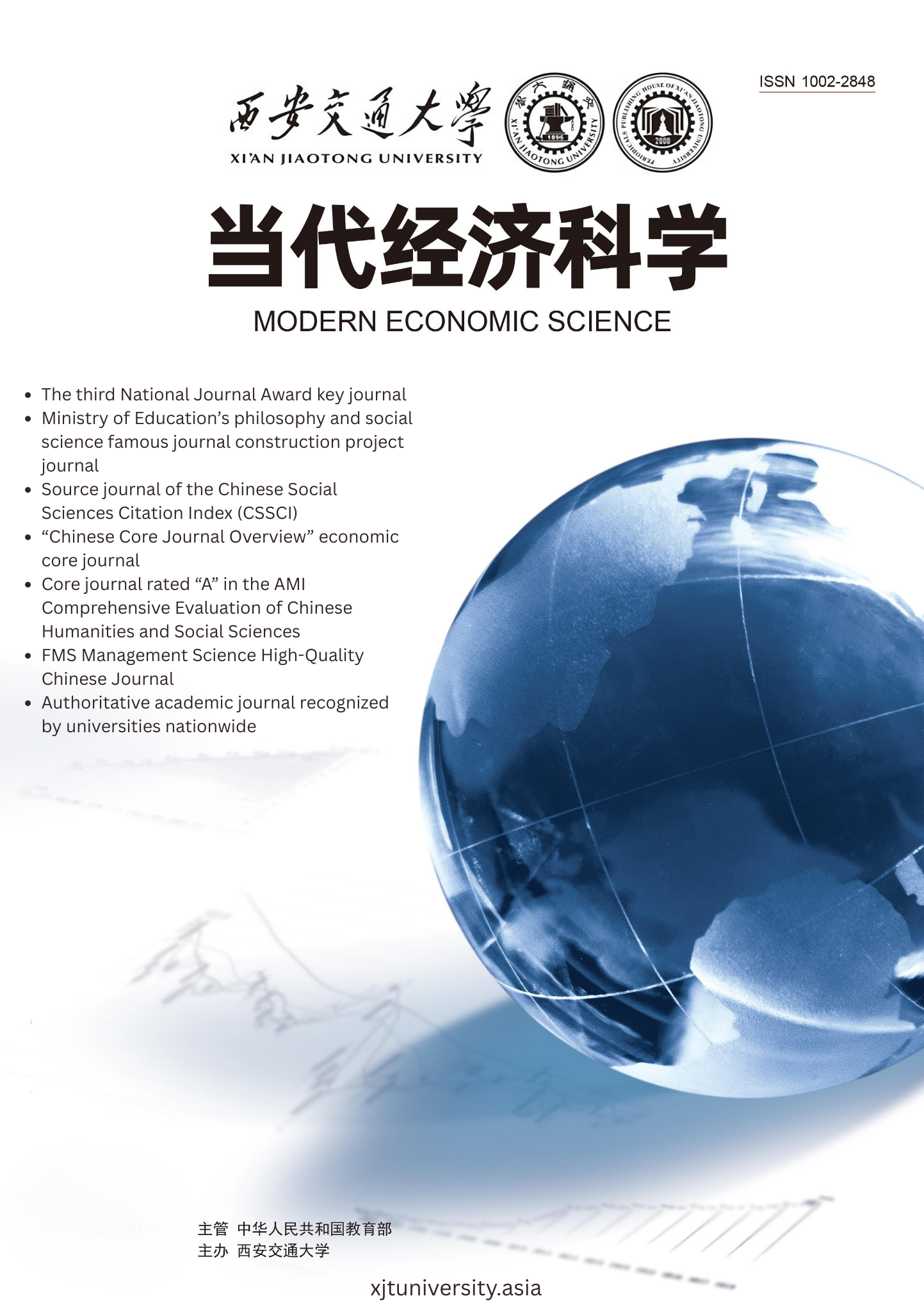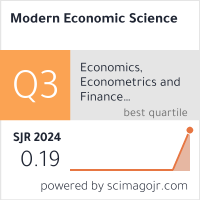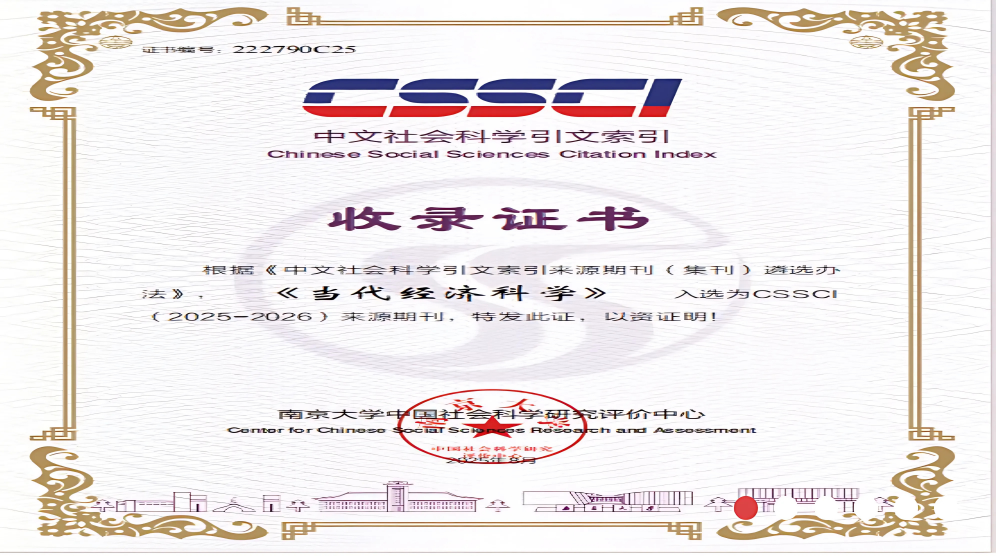High-Quality Employment in Digital Economy Development: Conceptual Deconstruction and Pathway Exploration Based on Labor Force Commodity Theory
DOI:
https://doi.org/10.20069/kh64w580Keywords:
digital economy, labor force commodity, high-quality employment, labor productivity, labor market effects, common prosperity, socialist employmentAbstract
Since the 18th National Congress of the Communist Party of China, the Chinese economy has undergone a profound transformation from high-speed growth to high-quality development. In alignment with high-quality development and the people’s aspirations for a better life, high-quality employment has emerged as a new paradigm for the era. Amid the wave of digital and intelligent transformation in economic development modes, numerous scholars have researched employment issues related to digital economic development, yet predominantly focusing on singular dimensions such as the employment “replacement” or “creation” effects, or changes in labor income share. However, high-quality employment represents a comprehensive employment system with rich contemporary implications and distinctive Chinese socialist characteristics. Examining its relationship with digital economic development from a systemic perspective holds significant importance.
This paper takes Marx’s labor force commodity theory as its logical starting point and systematically deconstructs the scientific connotations of high-quality employment following the framework of “joint construction-sharing-common prosperity-human development.” Using the entropy method, we construct a high-quality employment index and empirically test the effects and formation processes of digital economic development. The research findings reveal: First, development constitutes the fundamental pathway to high-quality employment. The digital economy, representing the direction of advanced productive forces, exerts a “double-edged sword” effect on high-quality employment; however, its positive promotional effects predominate, injecting new momentum into high-quality employment. Second, digital economic development propels labor market integration and capital deepening, reshaping labor circulation mechanisms and production modes, thus creating opportunities for efficient joint construction and human development aspects of high-quality employment; nevertheless, it poses negative challenges to the realization of sharing and common prosperity. Third, the full realization of the digital economy’s positive effects is conditionally dependent. The expansion of state-owned enterprises, enhancement of rule of law, and strengthening of trade union power contribute to better balancing the relationship between economic profits and labor justice, collectively constructing a multi-path system for high-quality employment.
Compared to previous literature, this paper’s potential marginal contributions include: First, strengthening holistic perspective and systemic thinking by treating high-quality employment as a comprehensive socialist employment system, conducting in-depth discussions on its inherent attributes and contemporary implications, thus providing a novel perspective for subsequent research. Second, focusing on the “technology-economy-distribution” characteristics of digital economic development, constructing a theoretical framework for its impact on high-quality employment, offering theoretical reference for unveiling the “black box” of digital economy’s complex influences. Third, through empirical analysis, scientifically identifying potential negative effects of digital economic development and their operational mechanisms, while exploring feasible correction pathways and practical countermeasures.
The main viewpoints of this paper provide supplements to the construction of employment theory with Chinese socialism characteristics. The relevant research conclusions and policy implications can assist government departments in implementing targeted “employment policy +” combination measures under the employment-priority orientation, addressing practical challenges in achieving high-quality employment within digital economic development.
Downloads
References
[1] 马克思恩格斯全集:第42卷[M]. 中共中央马克思恩格斯列宁斯大林著作编译局, 编译. 北京: 人民出版社, 1979:38.
[2] 马克思恩格斯选集:第1卷[M]. 中共中央马克思恩格斯列宁斯大林著作编译局, 编译. 北京: 人民出版社, 2012:57.
[3] 张志敏, 何爱平. 就业理论: 马克思经济学与西方经济学的比较[J]. 改革与战略, 2021, 37(2):9-15.
Zhang Z M, He A P. Employment theory: a comparison between Marxist economics and western economics[J]. Reformation & Strategy, 2021, 37(2):9-15.
[4] 金碚. 关于“高质量发展”的经济学研究[J]. 中国工业经济, 2018, 36(4):5-18.
Jin B. Study on the “high-quality development” economics[J]. China Industrial Economics, 2018, 36(4):5-18.
[5] 乔晓楠. 马克思主义劳动配置理论研究[J]. 政治经济学研究, 2021, 2(1):95-106.
Qiao X N. Research on Marxist theory of labor allocation[J]. Chinese Journal of Political Economy, 2021, 2(1):95-106.
[6] 柏培文. 中国劳动要素配置扭曲程度的测量[J]. 中国工业经济, 2012, 30(10):19-31.
Bai P W. Estimating the degree of distortion of labor resource allocation in China[J]. China Industrial Economics, 2012, 30(10):19-31.
[7] 蒋永穆, 廖浩君, 谢强. 推进中国式经济现代化必须坚持以人民为中心的发展思想[J]. 政治经济学评论, 2023, 14(3):22-41.
Jiang Y M, Liao H J, Xie Q. To advance Chinese-style economic modernization we must adhere to the philosophy of people-centered development[J]. China Review of Political Economy, 2023, 14(3):22-41.
[8] 马克思恩格斯选集:第3卷[M]. 中共中央马克思恩格斯列宁斯大林著作编译局, 编译. 北京: 人民出版社, 2012:670.
[9] 高波, 石有为. 市场一体化与企业劳动收入份额提升: 来自中国上市公司的经验证据[J]. 当代经济科学, 2024, 46(6):29-43.
Gao B, Shi Y W. Market integration and the increase of labor income share: empirical evidence from Chinese listed firms[J]. Modern Economic Science, 2024, 46(6):29-43.
[10] 肖磊, 尹庆双. “人的全面发展”的政治经济学: 渊源、内核与主线[J]. 当代经济研究, 2022, 33(5):26-38.
Xiao L, Yin Q S. The political economy of “people’s well-rounded development”: origin, core and main task[J]. Contemporary Economic Research, 2022, 33(5):26-38.
[11] 西斯蒙第. 政治经济学新原理[M]. 何钦, 译. 北京: 商务印书馆, 2020:15.
[12] 1844年经济学哲学手稿[M]. 中共中央马克思恩格斯列宁斯大林著作编译局, 编译. 北京: 人民出版社, 2018:73.
[13] 马克思恩格斯全集:第46卷上册[M]. 中共中央马克思恩格斯列宁斯大林著作编译局, 编译. 北京: 人民出版社, 1965:486.
[14] 马克思恩格斯全集:第30卷[M]. 中共中央马克思恩格斯列宁斯大林著作编译局, 编译. 北京: 人民出版社, 1995:480.
[15] 刘凤义. 劳动力商品再认识与中国特色社会主义政治经济学[J]. 经济研究参考, 2021, 43(12):102-120.
Liu F Y. Re-understanding of labor as a commodity and socialist political economy with Chinese characteristics[J]. Review of Economic Research, 2021, 43(12):102-120.
[16] 张三元. 论美好生活的价值逻辑与实践指引[J]. 马克思主义研究, 2018, 36(5):83-92.
Zhang S Y. The value logic of and practical guidance for a beautiful life[J]. Studies on Marxism, 2018, 36(5):83-92.
[17] 马克思恩格斯全集:第21卷[M]. 中共中央马克思恩格斯列宁斯大林著作编译局, 编译. 北京: 人民出版社, 1965:570.
[18] 王安向, 王新华. 社会主义阶段的劳动不仅仅是个人的谋生手段[J]. 经济科学, 1984, 6(6):24-27.
Wang A X, Wang X H. Labor in the socialist stage is not just a means of livelihood for the individual[J]. Economic Science, 1984, 6(6):24-27.
[19] 孙早, 高昕凯. 智能化、劳动力有效配置与就业质量提升[J]. 西安交通大学学报(社会科学版), 2025, 45(1):53-68.
Sun Z, Gao X K. Intelligentization, labor effective allocation, and the improvement of employment quality[J]. Journal of Xi’an Jiaotong University (Social Sciences), 2025, 45(1):53-68.
[20] 谢富胜, 吴越. 零工经济是一种劳资双赢的新型用工关系吗[J]. 经济学家, 2019, 31(6):5-14.
Xie F S, Wu Y. Is the zero-labor economy a new type of win-win employment relationship between labor and capital?[J]. Economist, 2019, 31(6):5-14.
[21] 柏培文, 张云. 数字经济、人口红利下降与中低技能劳动者权益[J]. 经济研究, 2021, 56(5):91-108.
Bai P W, Zhang Y. Digital economy, declining demographic dividends and the rights and interests of low- and medium-skilled labor[J]. Economic Research Journal, 2021, 56(5):91-108.
[22] 宣扬, 武凯文. 超时加班与劳动收入份额: 基于卫星夜间灯光的经验证据[J]. 世界经济, 2023, 46(10):217-240.
Xuan Y, Wu K W. Overtime work and labor income share: empirical evidence based on satellite night light[J]. The Journal of World Economy, 2023, 46(10):217-240.
[23] 赖德胜, 苏丽锋, 孟大虎, 等. 中国各地区就业质量测算与评价[J]. 经济理论与经济管理, 2011, 31(11):88-99.
Lai D S, Su L F, Meng D H, et al. Employment quality index of China’s provinces[J]. Economic Theory and Business Management, 2011, 31(11):88-99.
[24] 洪兴建. 中国居民收入增长与经济发展同步的测度方法及其应用[J]. 数量经济技术经济研究, 2020, 37(11):157-173.
Hong X J. Measurement and application of simultaneous growth of residents’ income and economic development in China[J]. Journal of Quantitative & Technological Economics, 2020, 37(11):157-173.
[25] 潘为华, 贺正楚, 潘红玉. 中国数字经济发展的时空演化和分布动态[J]. 中国软科学, 2021, 36(10):137-147.
Pan W H, He Z C, Pan H Y. Research on spatiotemporal evolution and distribution dynamics of digital economy development in China[J]. China Soft Science, 2021, 36(10):137-147.
[26] 戚聿东, 刘翠花, 丁述磊. 数字经济发展、就业结构优化与就业质量提升[J]. 经济学动态, 2020, 61(11):17-35.
Qi Y D, Liu C H, Ding S L. Digital economic development, employment structure optimization and employment quality upgrading[J]. Economic Perspectives, 2020, 61(11):17-35.
[27] 沈国兵, 张鑫. 开放程度和经济增长对中国省级工业污染排放的影响[J]. 世界经济, 2015, 38(4):99-125.
Shen G B, Zhang X. The effects of openness and economic growth on Chinese provincial industrial pollution emissions[J]. The Journal of World Economy, 2015, 38(4):99-125.
[28] 苑德宇, 常家铭, 张亦然, 等. 迈向劳动力统一大市场: 对中国劳动力市场分割的测度与分析[J]. 中国经济问题, 2023, 65(3):33-47.
Yuan D Y, Chang J M, Zhang Y R, et al. Towards integrated labor market in China: measurement and analysis of labor market segmentation on prefectural industry wage data[J]. China Economic Studies, 2023, 65(3):33-47.
[29] 张军, 吴桂英, 张吉鹏. 中国省际物质资本存量估算:1952—2000[J]. 经济研究, 2004, 50(10):35-44.
Zhang J, Wu G Y, Zhang J P. The estimation of China’s provincial capital stock: 1952-2000[J]. Economic Research Journal, 2004, 50(10):35-44.
[30] 常凯. 劳动关系的集体化转型与政府劳工政策的完善[J]. 中国社会科学, 2013, 34(6):91-108.
Chang K. The collective transformation of labor relations and improvement of the government’s labor policy[J]. Social Sciences in China, 2013, 34(6):91-108.
Downloads
Published
Issue
Section
License
Copyright (c) 2025 KONG Yanfang, FENG Chuhui, LI Xiaoxu, WANG Feng

This work is licensed under a Creative Commons Attribution-NonCommercial 4.0 International License.













